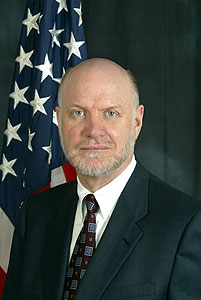Another shot over the bow of Congress

Just when you thought the Bush administration's contempt for Congress couldn't grow any stronger, earlier this week the administration's top official for mine safety and health decided that he had had enough of the Senate Appropriations subcommittee's questions, so he got up and left the proceedings. Think Progress has the video.
The administration's two top mine safety officials had finished testifying, but Chairman Arlen Specter (R-Pa.) asked them to stick around for an extra hour in case other questions came up -- as is the panel's custom. Sorry, said David G. Dye, the acting assistant secretary of labor for mine safety and health. He and Ray McKinney, the federal administrator of coal mine safety, had too much real work to do to sit around listening to a group of pesky senators. A rescue team was still in the Sago Mine, Dye said, and a mine fire was burning in Colorado.
While one can appreciate that people have busy schedules and work to do, when a Senate subcommitte is taking time out of its collective schedule to delve into issues surrounding several recent mining disasters, taking an extra hour to answer senators' questions isn't asking a whole lot. But that sort of arrogance and hubris seems to run through the veins of many in the executive branch these days. "Thank you for your time, Senators. But, frankly, we have more important things to do. Ta-ta." Now that's the way to win friends and influence people.
And this, in a nutshell, is the way this executive branch treats its supposedly equal partner: as an annoying impediment to the real work of government. It provides information to Congress grudgingly, if at all. It handles letters from lawmakers like junk mail, routinely tossing them aside without responding.
It unabashedly evades the need for Senate confirmation of officials by resorting to recess appointments, even for key government posts; see, for example, the recent recess appointments of the top immigration official, the number two person at the Defense Department and half of the Federal Election Commission.
It thinks of congressional oversight as if it were a trip to the dentist, to be undertaken reluctantly and gotten over with as quickly as possible. Most astonishingly, it reserves the right simply to ignore congressional dictates that it has decided intrude too much on executive branch power. President Bush's thumb-in-the-congressional-eye statement when he signed the bill banning torture of detainees, in which he announced that he would construe the law "in a manner consistent with the constitutional authority of the President," is one recent, and flagrant, example.
The Bush administration continues to dig a virtual moat around the executive branch as it methodically builds a towering castle that is increasingly impervious to criticism and oversight by the other, supposedly balancing branches of government. And with the recent appointments of conservative Supreme Court justices Roberts and Alito (expected to be confirmed by the Senate next week), the Bush administration may be counting on the high court to uphold its major league power grab when several highly questionable - and arguably illegal - tactics are likely to be brought before the Supreme Court over the coming weeks, months, years.
War on terror? More to the point, there is an internal war on the Constitution taking place, and the commander in chief might just as well be described as a virtual terrorist in chief, intent on bringing our most sacred governance document to its proverbial knees. Our founding fathers must be spinning in their graves.



0 Comments:
Post a Comment
<< Home